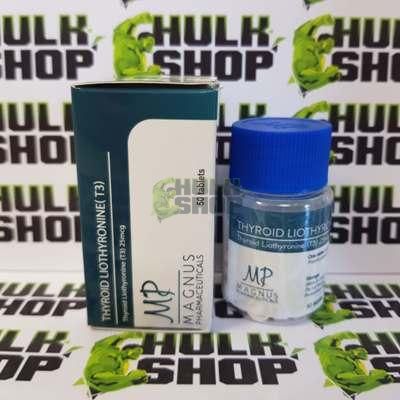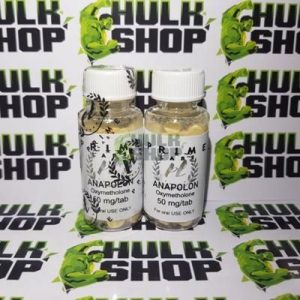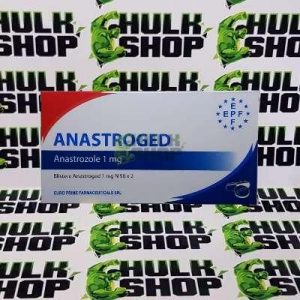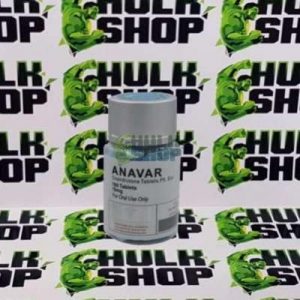Description
Indications for use Triiodine-liothyronine
Triiodine-liothyronine is mainly used when there is a need for rapid action and metabolism of thyroid hormone, for example, before scintigraphy after surgery for thyroid cancer, in scintigraphy to study the autonomic function of the thyroid gland, the so-called inhibition test, or in the investigation of suspected resistance to thyroid hormones. In special cases, Triiodine-liothyronine can also be given as a supplement to thyroxine.
Contraindications
Dosage
Adults – the dosage for hypothyroidism is individual. Initially, 10-20 mcg per day is given, in addition to thyroxine, with a gradual increase to 80-100 mcg per day. The first dose should be determined based on the patient's clinical response to treatment and laboratory findings.
In the triiodothyronine inhibition test, 80-100 μg are administered daily for 5-7 days. Before the introduction and its termination determine the 24-hour or 20-minute absorption of radioactive iodine by the thyroid gland.
Liothyronine is indicated for special indications in children, and dosage recommendations cannot be given.
Mode of application
The tablet is swallowed with a small amount of water. Liothyronine should be taken as standardized as possible with meals.In case of a significant change in eating habits, adjustment of the first dose of liothyronine may be required.
The tablet can be divided into two equal doses.
Warnings and Cautions
In the treatment of patients with cardiovascular diseases (heart failure, atherosclerosis, myocardial infarction or angina pectoris) in connection with the start of treatment.
In case of severe atherosclerosis in patients with myxedema, with or without angina pectoris, in connection with the start of treatment.
Liothyronine should not be given to patients with adrenal insufficiency unless the condition is treated.
Lactose
The preparation contains lactose. Patients with rare hereditary problems of galactose intolerance, the Lapp lactose deficiency or glucose-galactose malabsorption should not take the tablets.
Sodium
The medicine contains less than 1 mmol sodium (23 mg) per tablet, i.e. practically does not contain sodium.
Side effects
Treatment with liothyronine in therapeutic doses with a normal TSH level causes practically no side effects. With an overdose of T3 or too rapid increase in the dose, the same symptoms may occur as with hyperthyroidism (palpitations, tachycardia, cardiac arrhythmias, weight loss, angina pectoris, tremors, headache, diarrhea, nervousness, insomnia, sweating and reduced fever, tolerance).
Overdose
In acute overdose of liothyronine, mild to moderate symptoms are usually observed, such as hyperactivity, restlessness, irritability, tremors, sweating, fever, tachycardia, hypertension, diarrhea, possible difficulty sleeping, headache, and vomiting. Symptoms appear within 4-12 hours.
In case of a simple overdose, in addition to the indicated symptoms, there is a risk of muscle weakness, delirium, convulsions, coma, dehydration, arrhythmias and circulatory failure.
In chronic poisoning, mild symptoms are usually observed, similar to those of acute chronic overdose.
Mechanism of action
Liothyronine contains the biologically active liothyronine = T 3 bound directly to the core of the intracellular biological specific T 3 receptor. Liothyronine has a qualitatively similar clinical effect as sodium thyroxine = T 4 , but differs from it in several important respects. Liothyronine has a short latent period – the maximum effect occurs after a few hours. Liothyronine does not have a cumulative effect, and upon discontinuation of the previous metabolic state is restored within 2-3 days. T 3 is formed in humans partly in the thyroid gland and partly in the liver. The role of the liver appears to be to provide the body with T4. One with the currently desired T3 output. In long-term treatment, thyroxine sodium is preferred in most cases, since the long-term effect of this drug leads to a more stable metabolic state and at the same time provides the liver with a T 4 substrate for the desired production of T 3 .
Pharmacokinetics
Absorption
Liothyronine is easily absorbed and reaches 95%. The time to reach maximum concentration is 1-2 hours.
Distribution
Liothyronine is transported in the blood only in association with TBPA and albumin. Only about 0.5% of whey is free, not bound to proteins. The volume of distribution alone is much greater than that of thyroxine.
Metabolism and Elimination
T3 is rapidly converted in the liver to various inactive metabolites, which are ultimately excreted through the kidneys and intestines. Dependence on liver and kidney function is low.
The elimination half-life averages 25 hours in adults and 7 hours in children.
Where to buy Triiodine-liothyronine in Ukraine?
You can buy Triiodine-liothyronine at a bargain price in Ukraine by placing an order on the website of the online store of sports pharmacology and anabolic steroids Hulk Shop. With the help of the transport company Nova Poshta, we will send you an order to anywhere in the country with the possibility of paying for the goods by cash on delivery.






Reviews
There are no reviews yet.